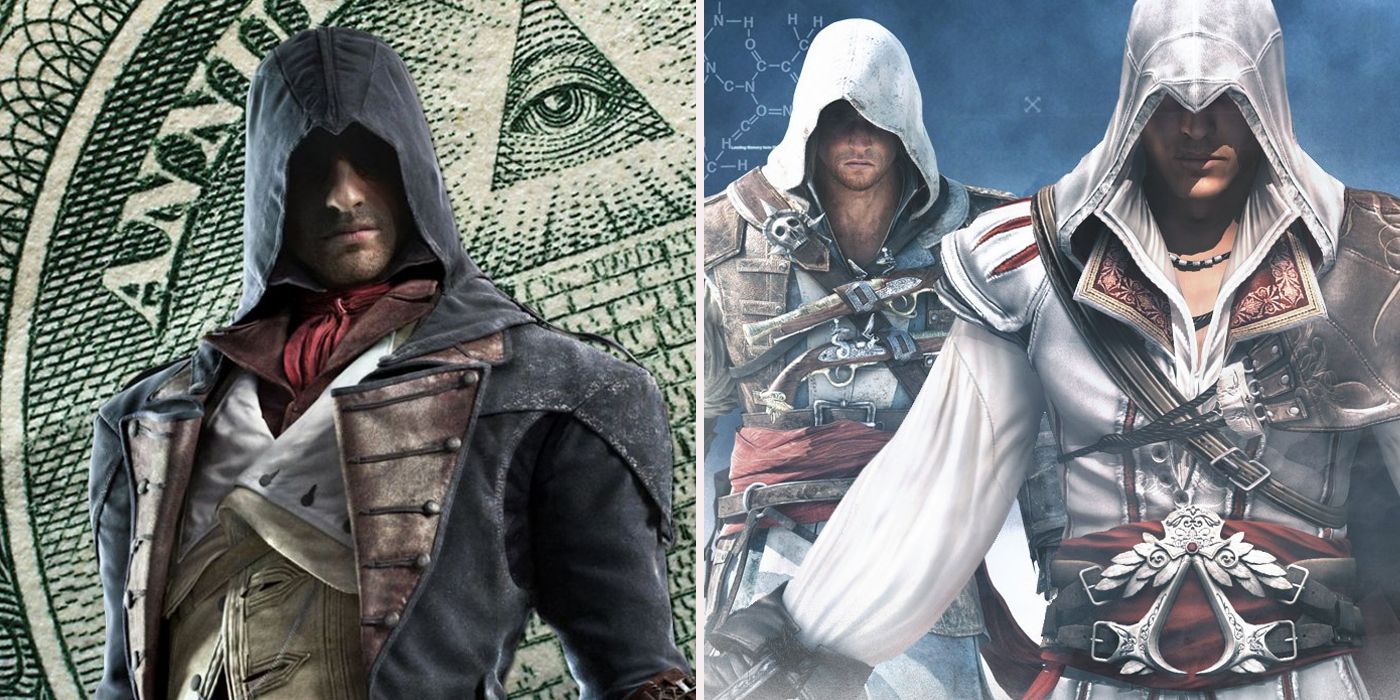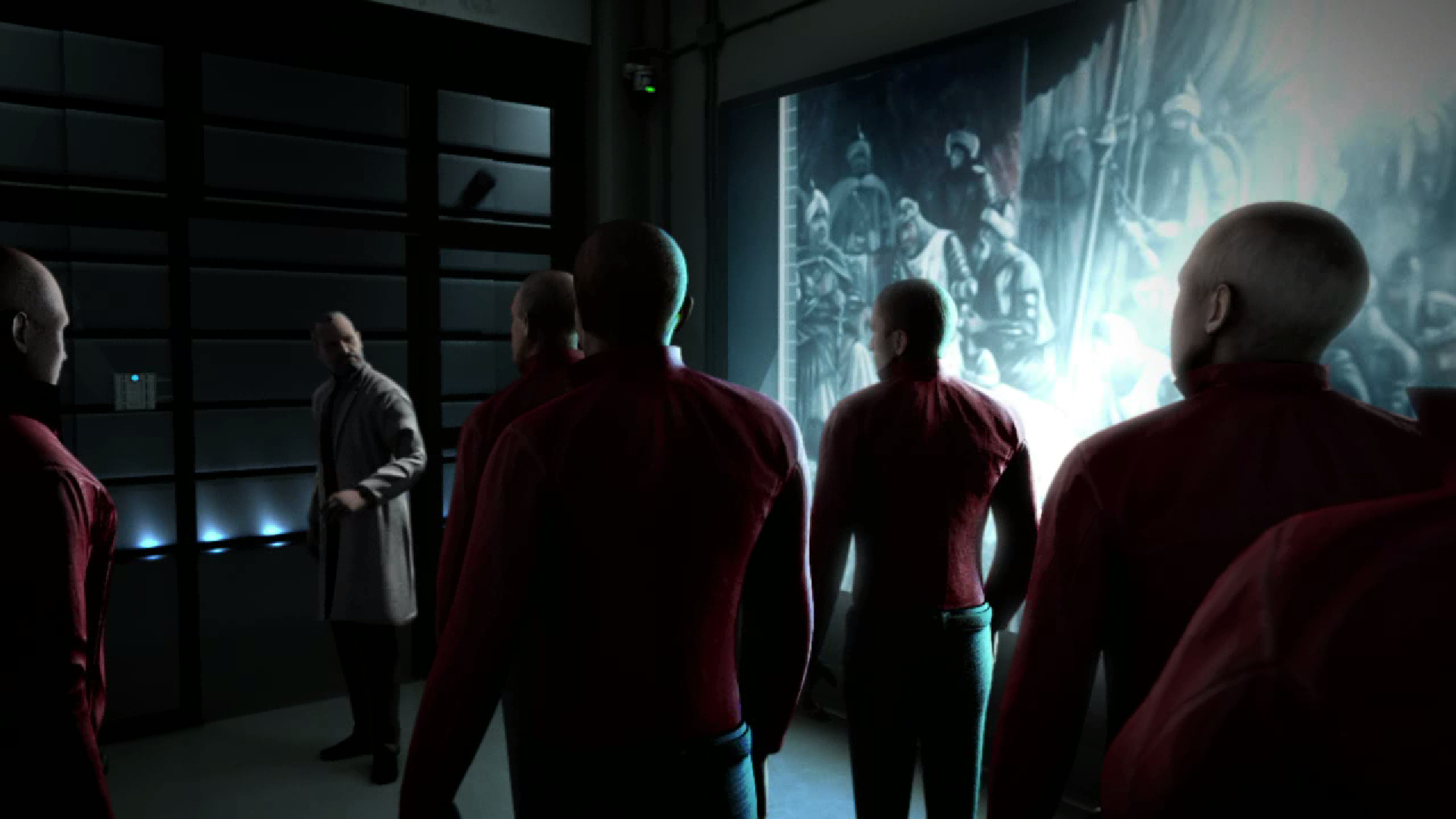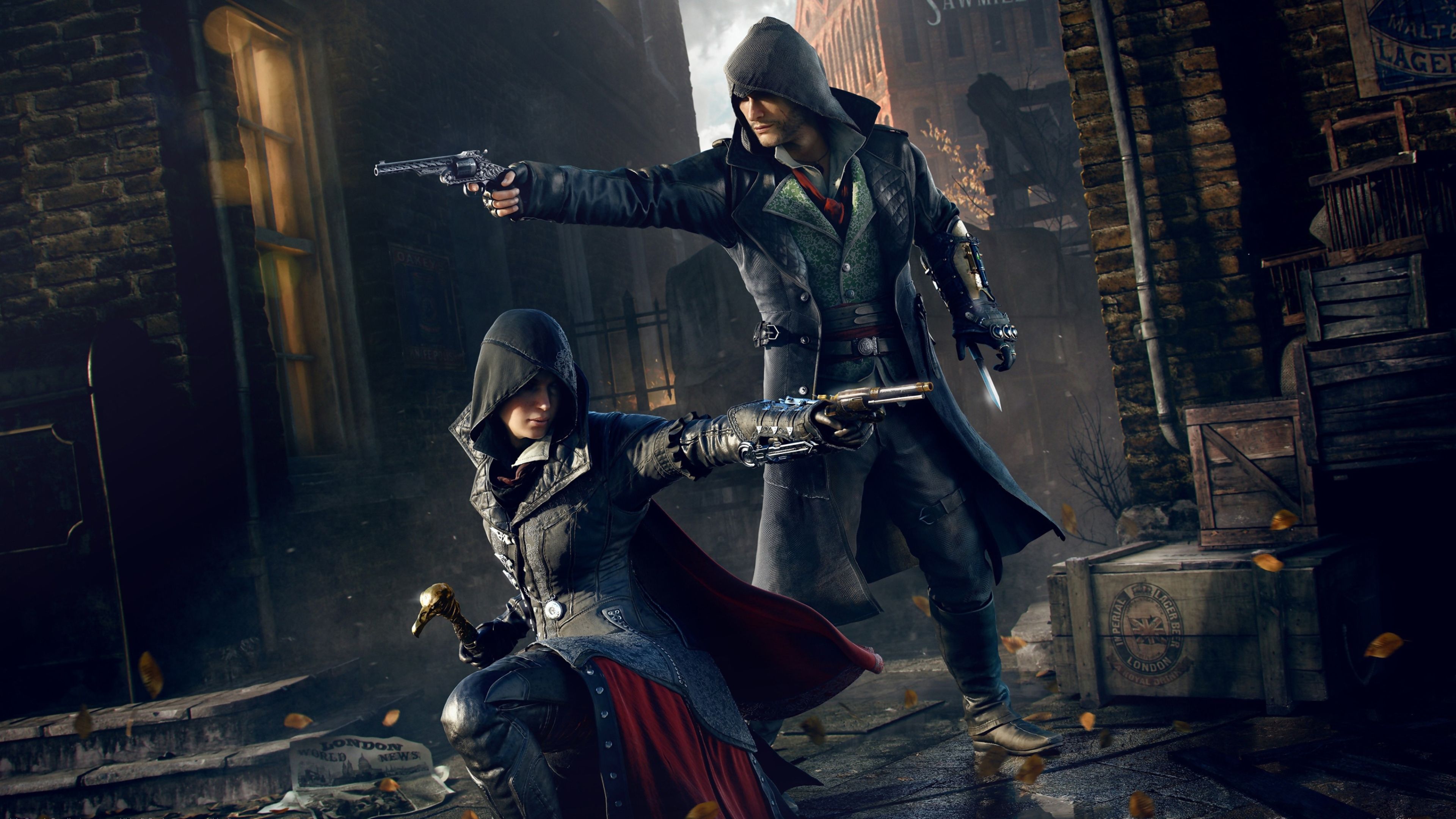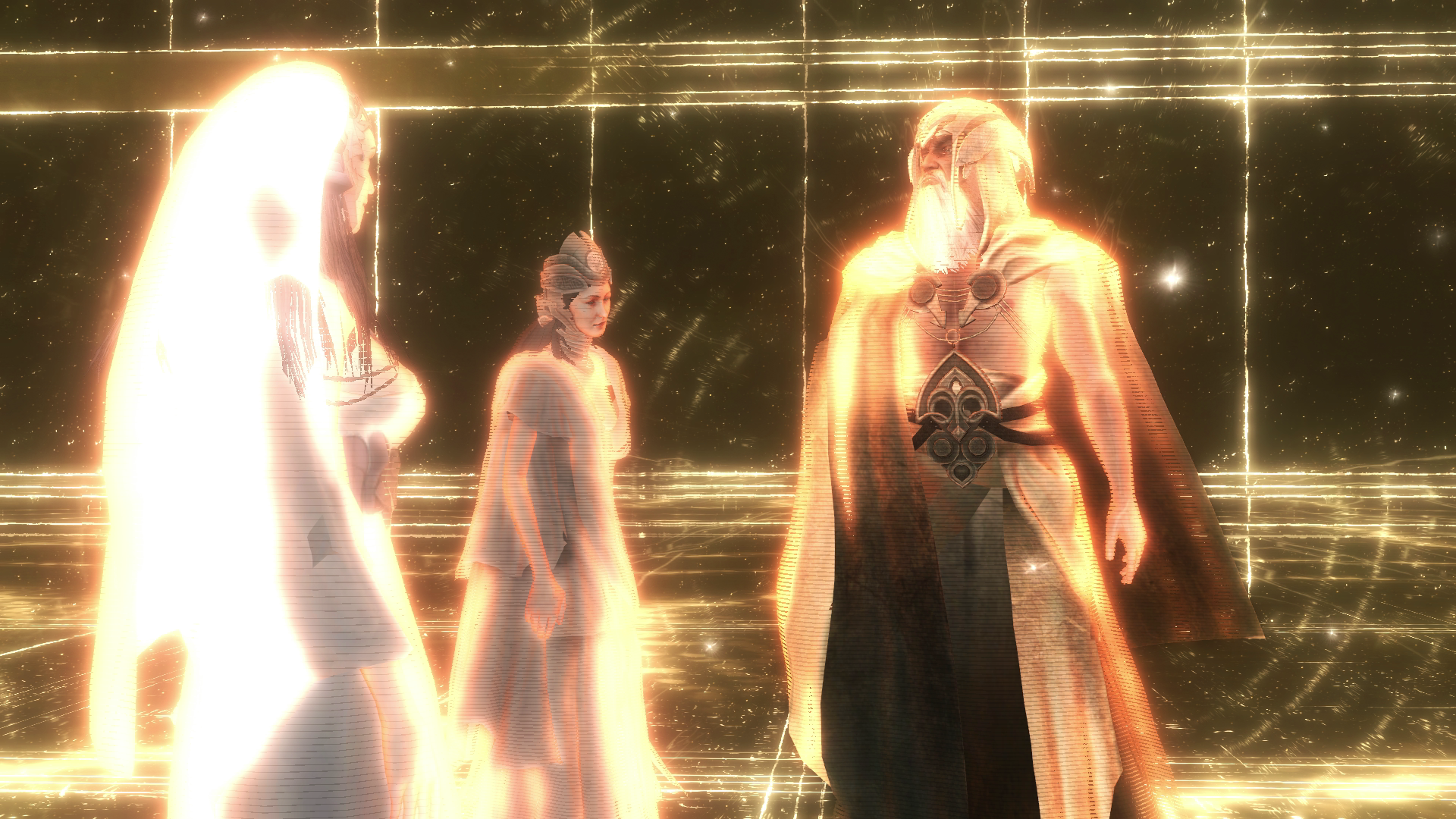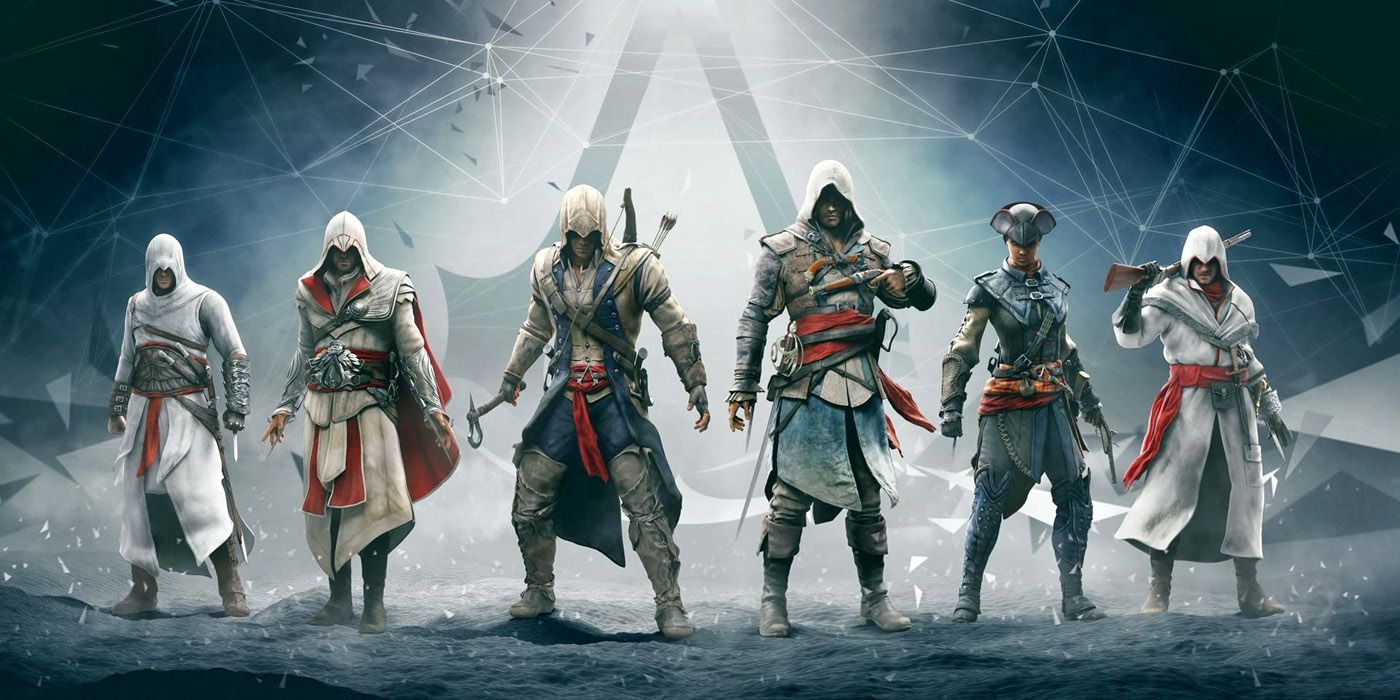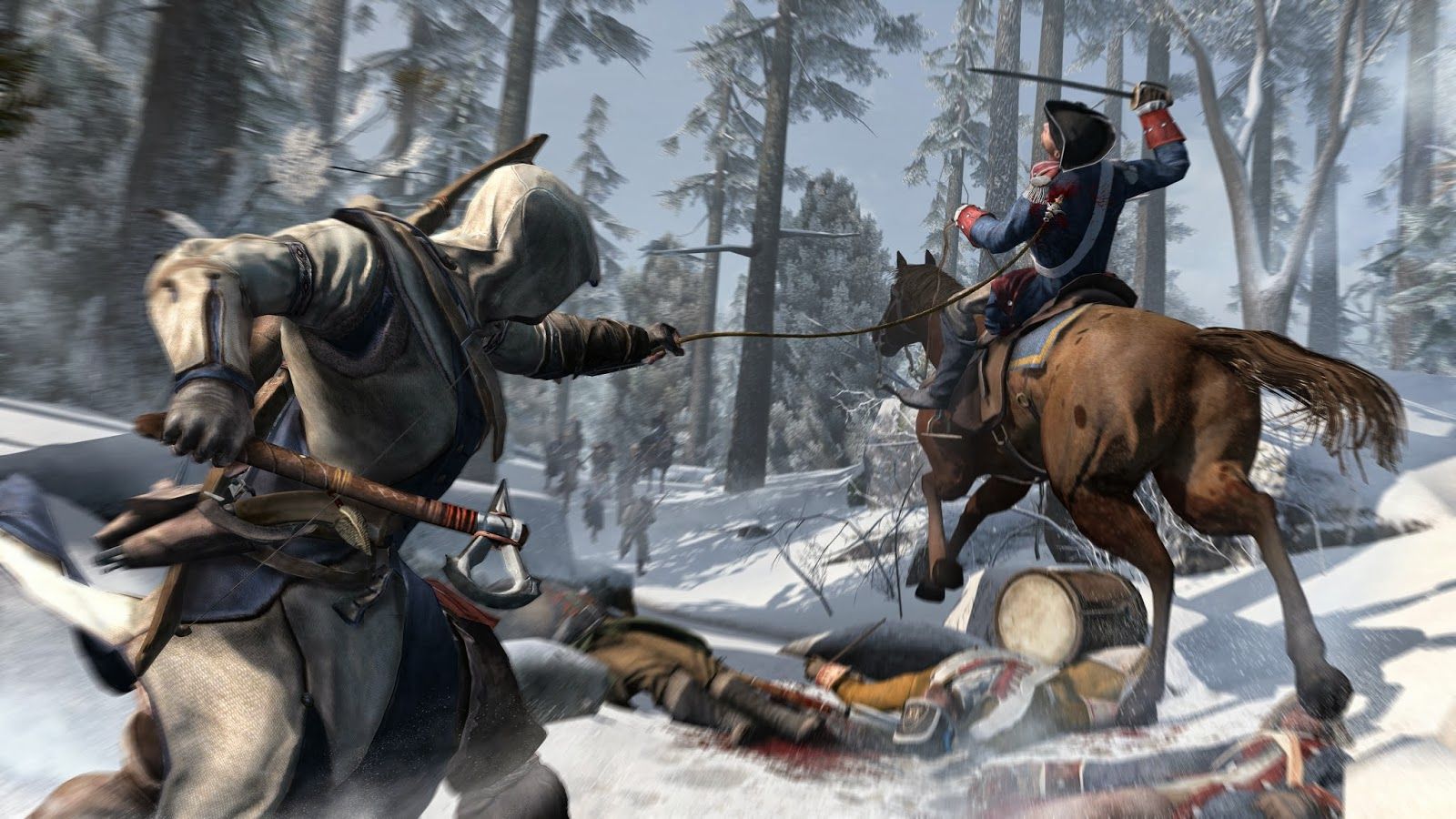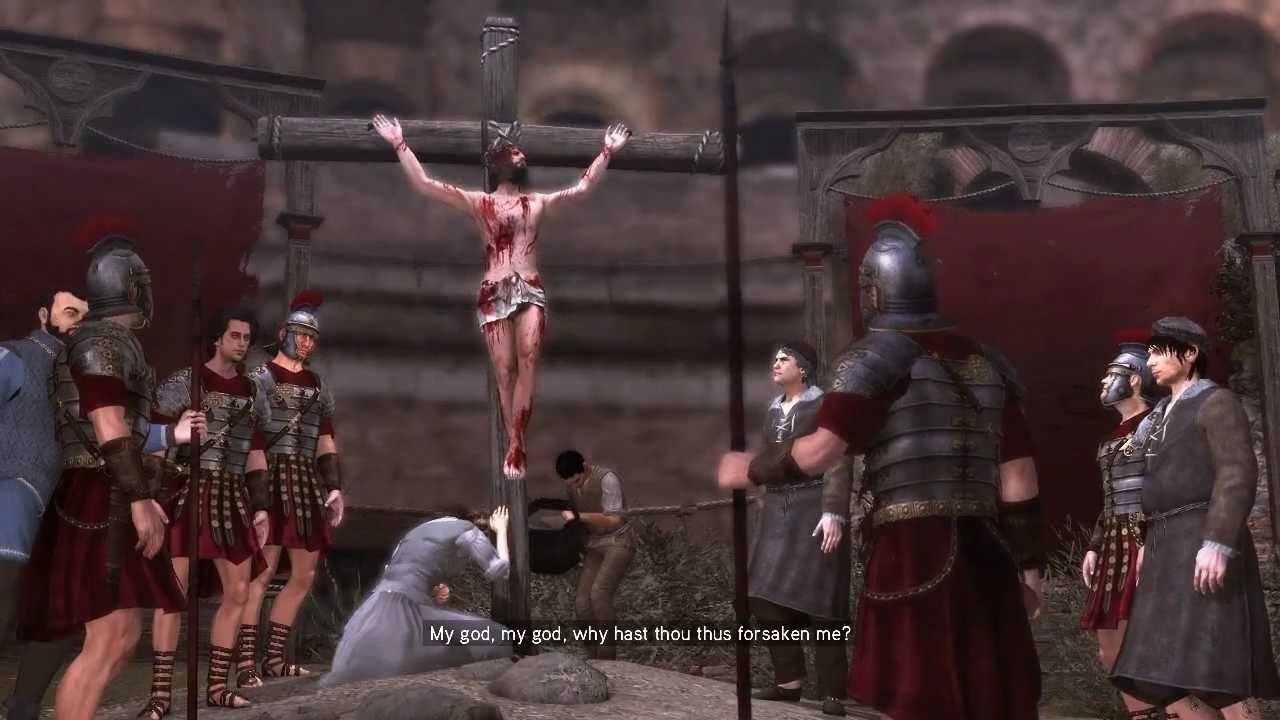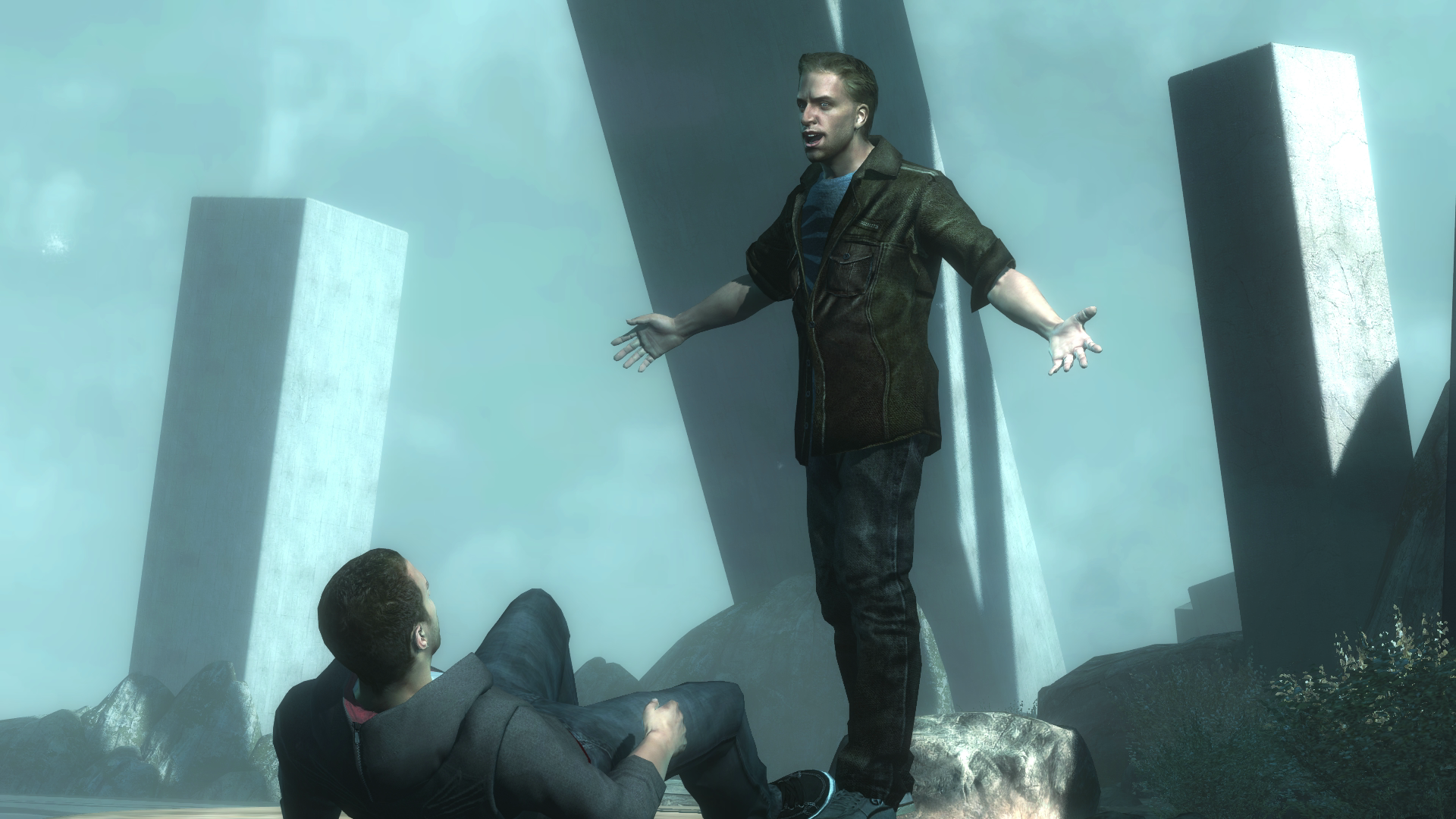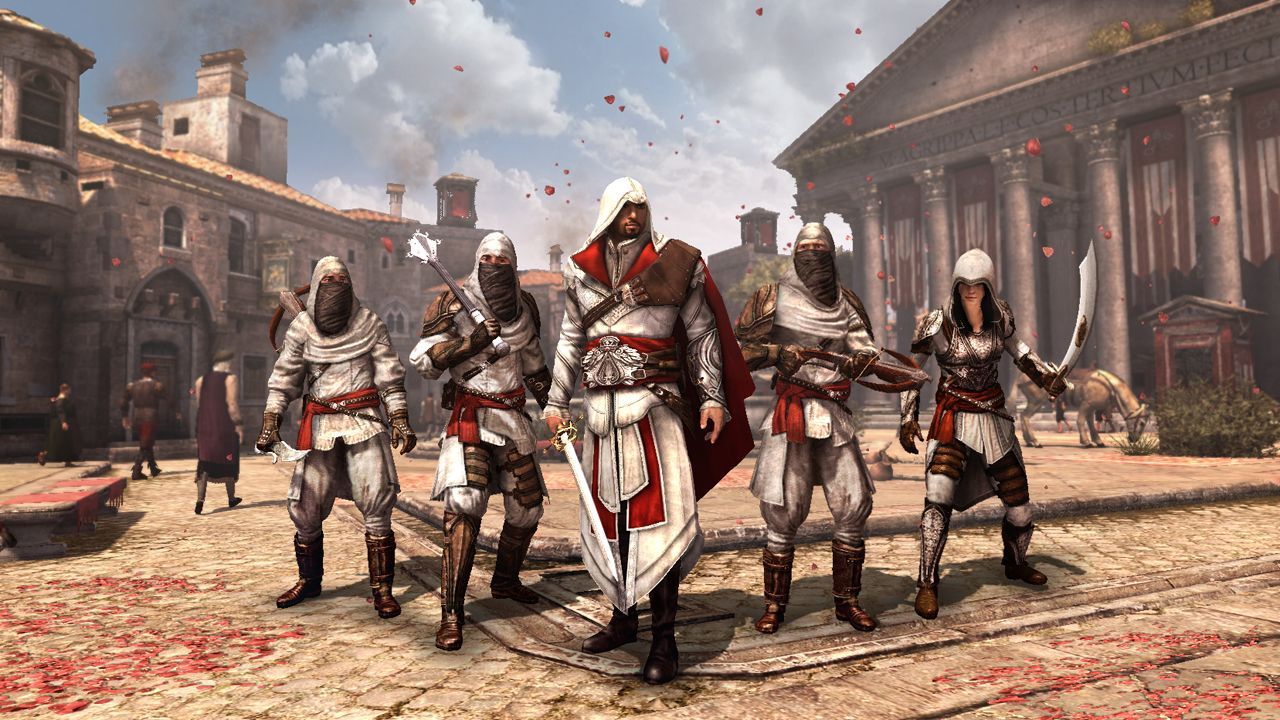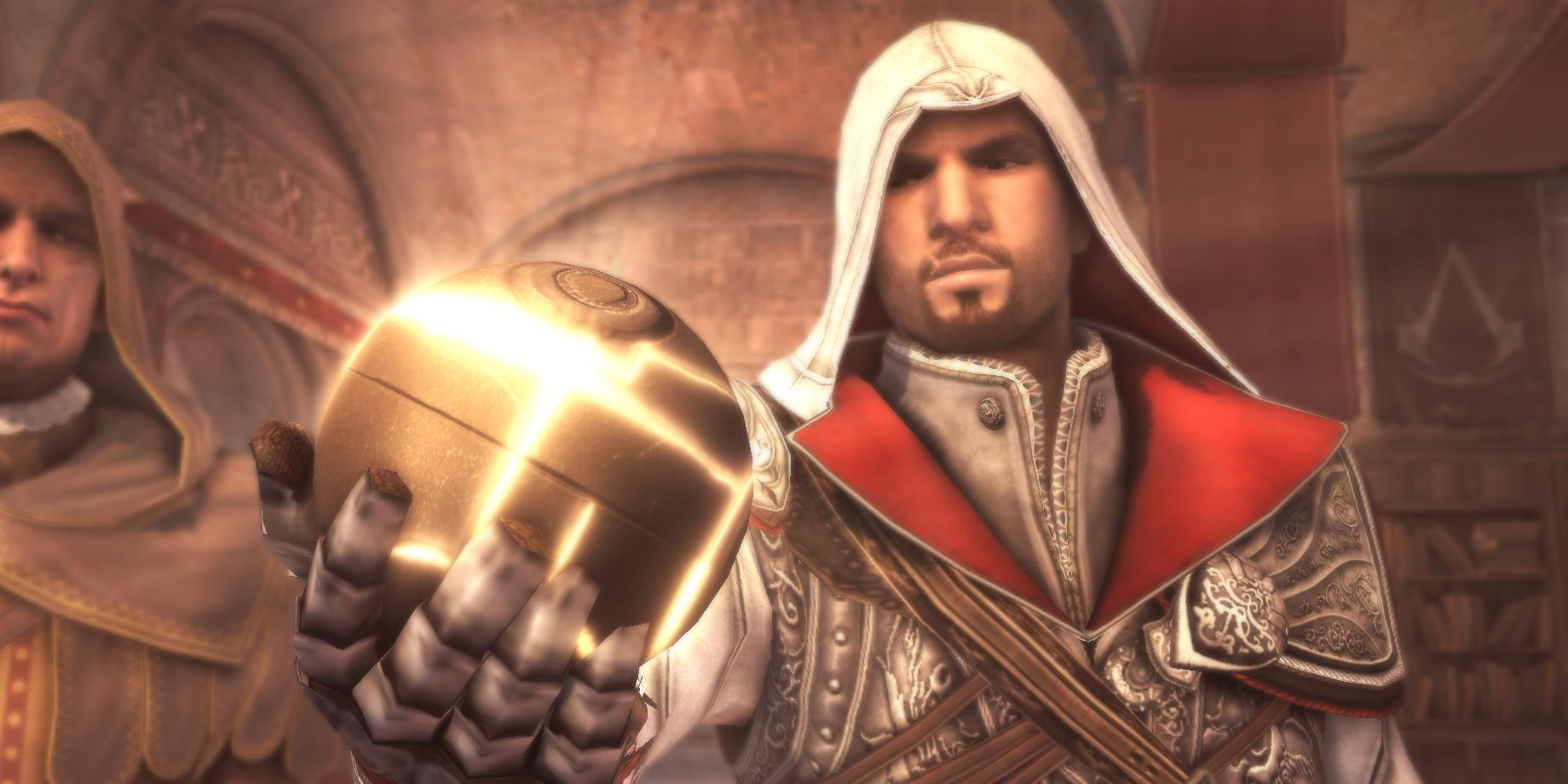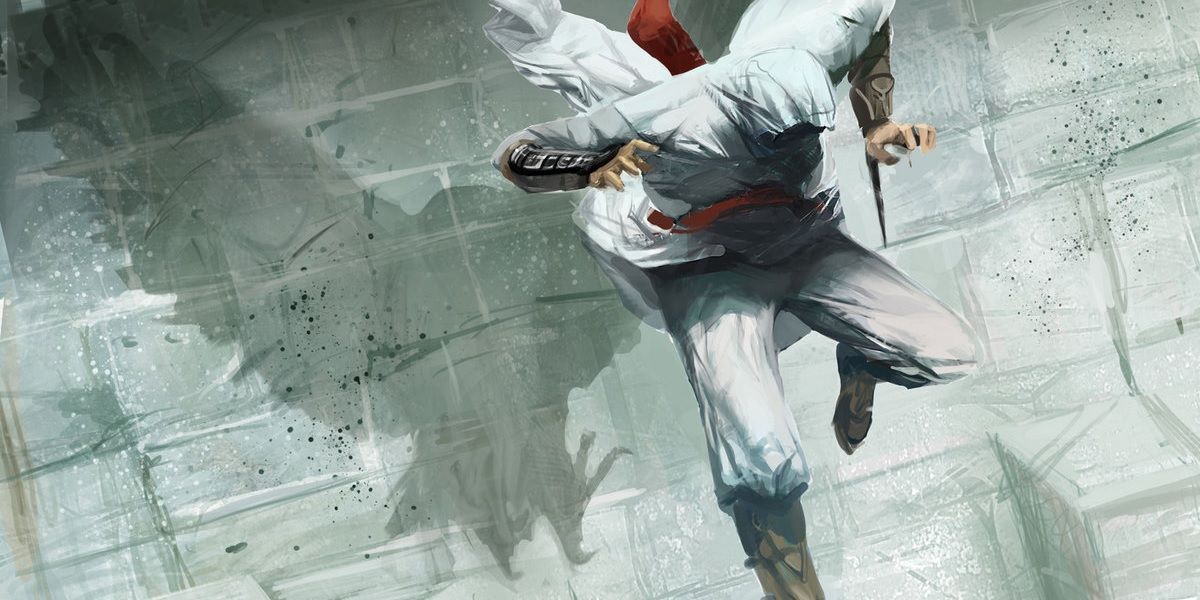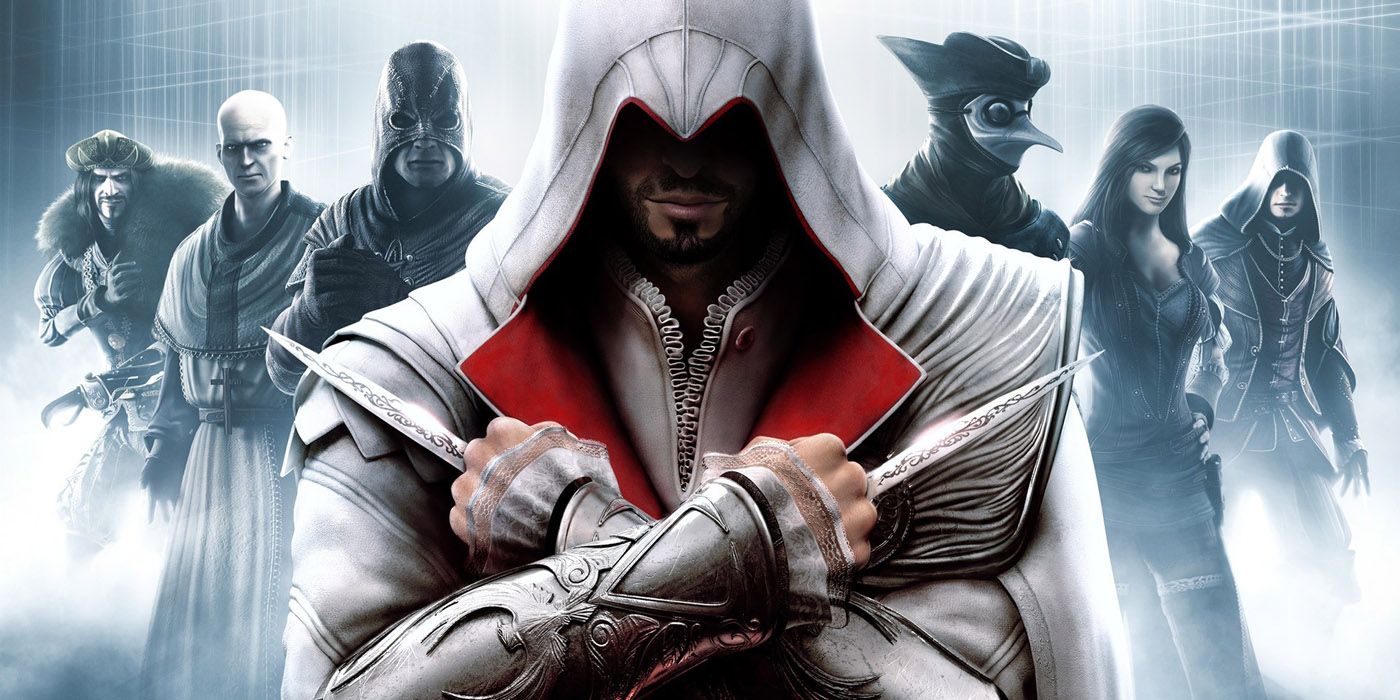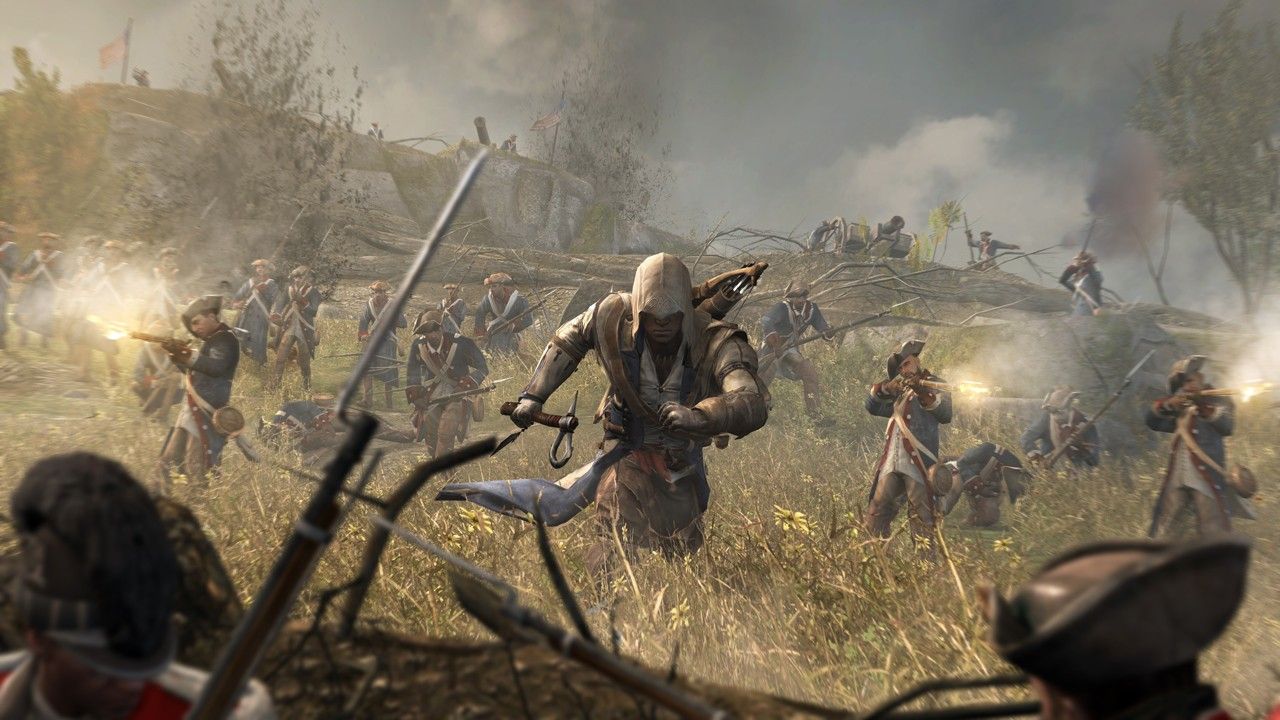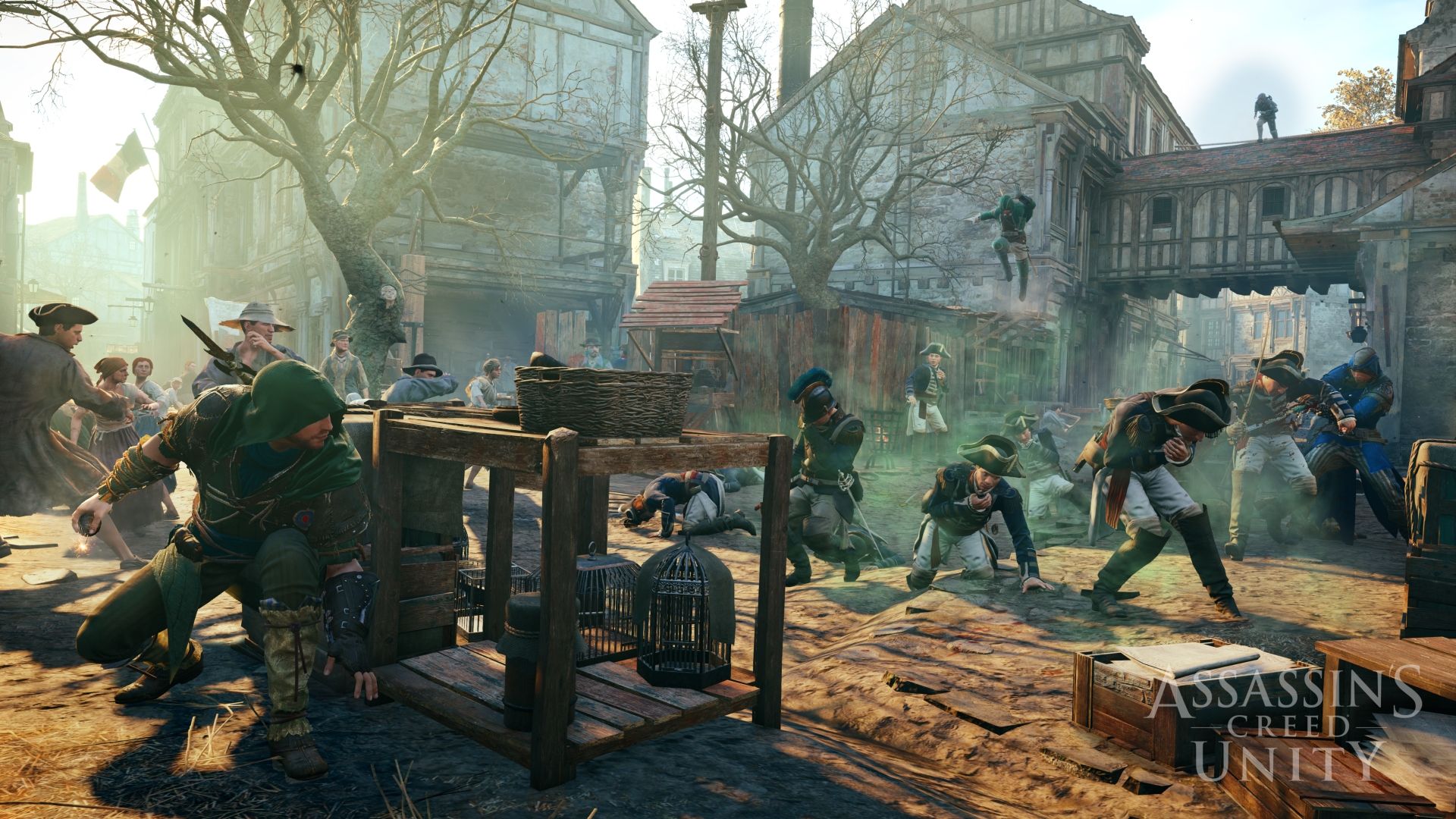The plot of the Assassin's Creed series is kooky. It makes use of ancient civilizations, magic tech, the Hashashin (known commonly as the Assassins), the Knights Templar, the Illuminati, corrupt corporate entities, genetic fingerprinting, doomsday theories about the year 2012, simulated realities, time-travel, and much, much more. The tangled narrative has given rise to some intriguing fan theories.
The primary conflict in Assassin's Creed is between two warring medieval orders-- the Assassins and the Knights Templar. The Assassins and Knights Templar have survived to the present day (2012 in the first game). The Knights Templar's present-day doppelganger is a shell corporation called Abstergo. Abstergo has created a device called an Animus, through which certain individuals can link up with their genetic ancestors at various moments in history, achieving a sort of technologically enabled psychic time-travel.
Abstergo and the Knights Templar are effectively the same fascistic entity with one goal: to collect the Pieces of Eden and use them to rule the world. These powerful artifacts were created by an ancient race known cryptically as "The Ones Who Came Before." They were once humanity's overlords.
The Templars want to use the Pieces of Eden either to bring The Ones Who Came Before into power again or to become humanity's overlords themselves. Conversely, as proponents of free will, the Assassins seek to stop the Templars at all costs.
Because of this elaborate plot, there are many things about the games that don't necessarily make sense or get lost and forgotten in the ether. So stay turned for the 15 Assassin's Creed Fan Theories That Solve Massive Plot Holes.
Abstergo Are Actually The Good Guys
As proponents of free will and sworn enemies of the draconian Knights Templar, the Assassins are the lesser of two evils. That's the most common take away from the series. Sure, the Assassins do some horrible things, but they do them in the name of securing humanity's control of its own destiny.
Freedom's always a good thing, right? Well, not according to some fan theories. The theories themselves run the gamut from plausible to outright absurd but they have one common thread: Abstergo and the Templars are right about human nature.
Humans are easily corrupted and must not be allowed to control of their own destinies. As the series progresses, such fan theories have been both vindicated (see Desmond's apparent corruption in Brotherhood and Clay's dastardliness in Rogue) and challenged (see just about any other game in the series).
It's All About Eve
"[Eve's] DNA is the key," according to Clay's digital consciousness in Brotherhood. In the lore of Assassin's Creed, Adam and Eve were Isu-human hybrids. They were also the first Assassins.
Their son Cain killed their other son Abel. Cain then founded the Knights Templar. This is why Syndicate's twin protagonists are great fodder for speculation: they're twins like Cain and Abel and one of them seems to be a callback to Eve.
As commenter Sorrosyss put it in the Ubisoft forums, there are two options for explaining various plot holes involving the First Civilization and the Sages.
In Syndicate, "[Either] Eve still lives or Eve is reincarnating." The commenter sees the reincarnation option as the more plausible of the two, citing her hybrid status. Her Isu DNA would make gene-based reincarnation "entirely possible," as in the case of Juno's perpetually reincarnating Isu husband Aita.
The Isu Might Explain The Ancient Egyptian Gods
Long, long ago, a genetically advanced pre-human civilization showed up on Earth. They're known as the Isu, or the First Civilization, or The Ones Who Came Before. They brought a bunch of super-advanced technology with them and even eventually began mating with some humans.
Humans feared, worshipped, and were enslaved by them, in the same way that humans worshipped the Old Ones as gods in Lovecraft's fiction. The tendency of humans to perceive the Isu as gods, and to worship them as such, has led to some wild fan theories.
In the most recent theory, Redditor AxelLightwood followed a similar line of thought when they speculated on what might happen in Assassin's Creed: Origins.
According to the theory, "the Apple of Eden or another Piece of Eden will be put into play, and when [Origins protagonist] Bayek meets the Keepers, he will think they're Egyptian gods instead of [the Isu]."
If true, the theory would "add more modern story as well as more background on the [Isu]." Fans will have to wait for Origins to test the theory.
Assassins Are Terrible At Their Job
The Assassins have a broad definition for what constitutes evil. Why does the Animus consider armed guards fair game? They can't all be heartless collaborators, privy to the secret machinations of their Templar employers, deserving of death.
Redditor Gonomed pointed out that the Assassins' cardinal rule is to "stay your blade from the flesh of the innocent." Yet, as the theory points out, in every Assassin's Creed game, you can go around murdering guards and low-level thugs as much as you please without "desynchronizing" your murderous actions from the general manner in which your ancestor behaved.
At best, the Assassins are noble-minded killers with hearts of gold. At worst, though, they're murderous psychopaths with cultist sensibilities.
In the same thread, Redditor PileMaster added that the Assassins weren't even "effective." Remember the opening scene of Black Flag? You're nothing more than a shipwrecked pirate, and yet you chase down and kill an (albeit wounded) Assassin. It's kind of stupid-- not Assassin's Creed Kinect stupid, but close.
The Animus Is Imprecise
A human brain's memory is both fallible and subjective. There's no reason to believe that an Assassin's genetic memory should be any different. So, is the Animus verbatim history as it happened, objectively recorded in genetic memory? If not, then what is it, an illusion, or worse, a delusion?
One theory by Redditor rougegoat posits that what happens in the Animus is neither objective reality nor an interactive yet objectively recorded account of historical events. Rather, according to this theory, the Animus shows a digital approximation of a subjective memory.
There's another reason to doubt the Animus's historical accuracy, regardless of the memory's historical accuracy. The Assassin's Creed series explains new abilities in terms of bug fixes to the Animus.
"Throughout the series," the Redditor notes, "Rebecca [Crane] makes sure you know that she's done a few software upgrades on the system [to correct] bugs in the [Animus's] approximation and not in the memories themselves."
If the Animus requires bug fixes, then it's by definition imperfect. Whatever it is, it's flawed. When you consider that Abstergo hopes to conquer the world with it, the flaws are probably for the best.
Jesus And The First Civilization
As Redditor Zadder put it, "[Neither Assassin nor Templar himself,] Jesus Christ was an emissary of the First Civilization sent to Earth to re-enslave mankind through the founding of Christianity."
This theory builds on the idea that "the [Apple] described in the Bible as having been stolen from Eden was actually a Piece of Eden, a First Civilization tool capable of controlling the minds of the masses." Essentially, in this interpretation, God is a euphemism for a race of ancient pre-humans.
It's a dark theory but it checks out with the existing mythos, while accounting for the rise of religious traditions. After all, in the lore, Eden was, in reality, "a [Pieces of Eden-making] factory" that "created mankind to act as slave labor." The Biblical story of the Fall is actually an account of the rebellion that Eve led against the First Civilization.
Theory About Subject 16 and Desmond
Many fan theories relate to Brotherhood and its baffling ending. Assassin's Creed III and Assassin's Creed IV: Black Flag complicated the series plot by killing off Desmond and introducing yet another frame-story metanarrative, that of the game developers themselves.
However, before all that, before even Revelations, the big questions were: "why did Desmond stab Lucy?" and "is she really dead?" Xbox Achievements commenter XToastySniperX posted a theory that Desmond stabs Lucy because he's possessed by the Apple of Eden.
According to the theory, "Juno or one of her kind/people/slaves programmed something into the Apple to force Desmond to kill Lucy, so that they couldn't have a 'relationship.'"
Why? Because the Apple "wants Desmond and Eve to mate," thereby producing a new humanoid yet alien-like race with which to start history anew. (The Apple's desires match those of the Templars in this regard.)
Then, in the last moments of Brotherhood, a new voice is heard. The theory posits that one of the voices belongs to Subject 16. As it turns out, the voices belong to William Miles (Desmond's father) and another Assassin, Harlan Cunningham. Still, it was a good guess.
Brotherhood's Cliffhanger Ending In Inception Terms
Prior to the releases of Revelations and Assassin's Creed III, there was a question about whether the ending of Brotherhood even happened. Did Desmond really stab Lucy or did he just think he stabbed Lucy? What if it's all a big digital dream, like The Matrix or Inception?
According to Kotaku, Brotherhood's writer Jeffrey Yohalem commented, saying, "People seem to debate between [some sort of Inception-like dreams-within-dreams thing going on] and whether the Assassins have grabbed Desmond or they've taken him out and hooked him up to some horrible animus in a car."
Before the series went fully sideways into postmodern swashbuckling glory and wrote Ubisoft and pirates into the series' timeline, this theory seemed plausible. Nowadays, it's a relic from a time when Assassin's Creed games seemed to care about sensible continuity.
Subjective Recollection Explains Ezio's Character Changes
This theory harkens back to the question of the Animus' accuracy (or inaccuracy) as a record of real events. In Assassin's Creed II, Ezio is a capable Assassin but he's also almost boyishly naive in moments, learning the order's ways from Leonardo Da Vinci.
When he resurfaces in Brotherhood, though, he's a total headstrong "boss," as Ubisoft commenter Assassin_M put it. From Assassin_M's point of view, the marked differences in Ezio's personality can be explained in terms of "subjective memory recollection."
According to the theory, Ezio was "idiotic" and "insecure about it, so he... deluded himself" into remembering the early days of his Assassin career in a false, flattering light. "[In Assassin's Creed II,] everything revolved around Ezio. 'We all love you, Ezio,' 'We were all training you, Ezio,' 'You are important, Ezio,' and on and on. It never went down like that."
Assassin_M's theory qualifies all the coddling Ezio receives as "the exaggeration of an insecure child who wanted to feel special and important." Finally, "Ezio wised up by his 50s, [realizing] that the world does not revolve around him and that he's only a conduit for a more important message than he can ever comprehend."
Desmond Lives
Although he dies a hero and saves the world from annihilation by a solar flare, fans still refused to accept Desmond Miles's death in Assassin's Creed III. Desmond was the one thread holding the narrative together, and it seemed inexplicable that Ubisoft would cut him out completely. It wasn't long before fan theories arose claiming that Desmond, like some Assassin Elvis, is actually still alive.
Redditor AdmiralAkbar1 posed this question. "Is Desmond trapped in a computer like Subject 16? I honestly don't have that much evidence besides the fact that it's probable."
If Clay Kaczmarek can do it, why not Desmond? It seemed like the logical next step for the series that Desmond would reappear in some form. However, this theory gained such traction that a developer had to refute it in an "Ask Me Anything." No more Desmond, folks.
Getting Into Ezio's Genes
It's more than Ezio's personality that changes between games. His appearance also changes between games to a substantial degree. Why is that? There are a ton of plausible development-related explanations for the discrepancy, but the following lore-based explanation is the most intriguing explanation.
According to GameFAQs commenter rdnythesavior, "when [you] were playing through Assassin's Creed II and Brotherhood, [you] were pretty much forcing Ezio to tell us his story in the Animus." That is to say, the player's perception of Ezio is influenced by Desmond. We don't see Ezio as Ezio was. We see "Desmond dressed up as Ezio."
The theory continues. "In Revelations, [however,] Ezio's genes are trying to tell Desmond the rest of his story." Thus, in Revelations, you don't see Ezio by way of Desmond, but instead you finally see Ezio as he really looked, according to his genetic memory.
Freemason-Templar Connection
Writing for Game Rant, Andrew Dyce connected the Templars to the Freemasons prior to the release of Assassin's Creed III. "Washington has been featured alongside Connor in much of the game’s artwork, so perhaps the two join forces to rid the Freemasons of any Templar spies hoping to shape the future of America." This theory squared the series with actual history.
Neither exclusively Assassins nor Templars themselves, the Freemasons are "just boring guys who have meetings," according to the developer. In the real world, however, conspiracy theories linking the Knights Templar to the Freemasons date back to Abbe Augustin Barruel. Barruel connected the two groups via the Illuminati. In his four-volume History of Jacobinism, Barruel claims the Knights Templar were Satanists disguised as Crusaders.
For Barruel, the Templars, the Illuminati, and the Freemasons are all unified by their Satanism. Conspiracy buffs who buy into Barruel's mad, hateful vision of the world cite the Freemasons' longstanding presence in the United States as a sign of the nation's corruption. The Templars in Assassin's Creed are pretty tame by that standard.
The Glyphs Prove That Desmond Is Alive
According to the YouTube channel ACConspiracies, Desmond didn't die. In fact, he would return triumphantly in Unity. Where's the proof? Why, it's in the glyphs, of course.
The glyphs are symbols that only Subject 16 and Desmond understand. "In Revelations, we see Subject 16's mind get wiped from the Animus... In Assassin Creed III, Desmond's body and Subject 16's mind get destroyed but Desmond's mind still lives."
Basically, the theory suggests that Demond's mind must have survived, since he's the only one left who can interpret the glyphs, which he will use "as a way of teaching us about the terrors of the Templars and Juno," in Unity. You see, here's the thing about that, though-- Unity came out, and unfortunately, Desmond was still dead.
Abstergo Knew The Solar Flare Would Happen
This theory, posted to the Ubisoft forums by user Met4lM4ster, introduces the idea that Abstergo, being the nightmarish megacorporation that it is, has one insane contingency plan. In the lore of Assassin's Creed, "the Earth is soon to be destroyed once again by a solar flare, most likely on December 21, 2012." That much is a given.
According to the enticing albeit flawed theory, Abstergo and the Templars are ready for it, having "built several facilities deep inside the Earth's crust to shield themselves from the destruction. They will most likely inform the public through the government and will try to save as many as they can, falling in line with their ultimate purpose," i.e. world domination.
It's pretty clever, really. As commenter MisterB2001 notes, "Abstergo means 'I cleanse.'" Let the solar flare obliterate much of humanity, Assassins included, wait for smoldering to subside, and use your human slaves to build Eden anew. Too bad it doesn't jibe with canon.
There's Only One Ubisoft Universe
One tantalizing theory claims that Takkar, protagonist of Far Cry Primal, is actually the original Assassin. The theory solves a major plot hole: how the Assassins got from Eden (whenever that was) to recorded history.
Another theory states that Jason Brody of Far Cry 3, the whiny rich kid and accidental warrior, is in reality also an Assassin. This would all be conjecture but for the fact that Abstergo exists in the Far Cry universe, as well as in Watch Dogs universe.
Now imagine the Rayman series and its Rabbids spinoffs, all the Far Crys including Blood Dragon and Primal, the Hitman series, all the modern Tom Clancy games, the Watch Dogs series, the South Park games, Beyond Good and Evil, Might and Magic, Call of Juarez, and more-- all in the same universe as Assassin's Creed.
How else can you explain Abstergo's cross-franchise ubiquity? Unified theories aren't just silly thought-experiments, they're also plot hole-solvers.
---
Can you think of any other Assassin's Creed fan theories that solve massive plot holes? Let us know in the comment section!

